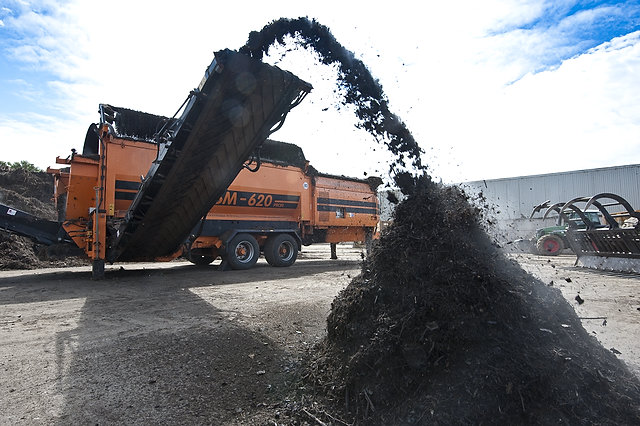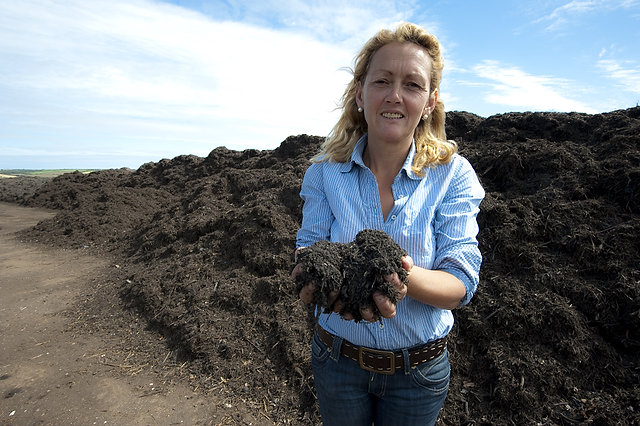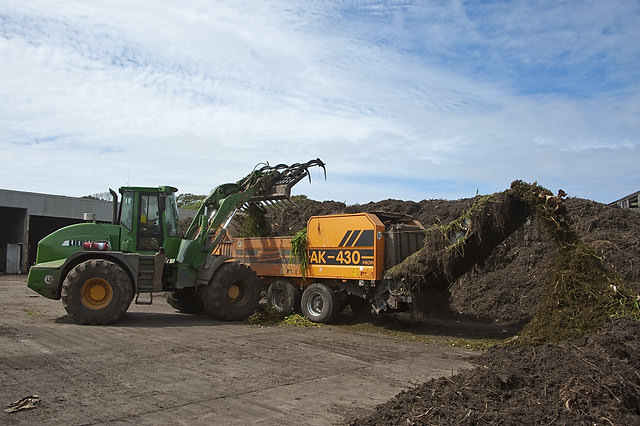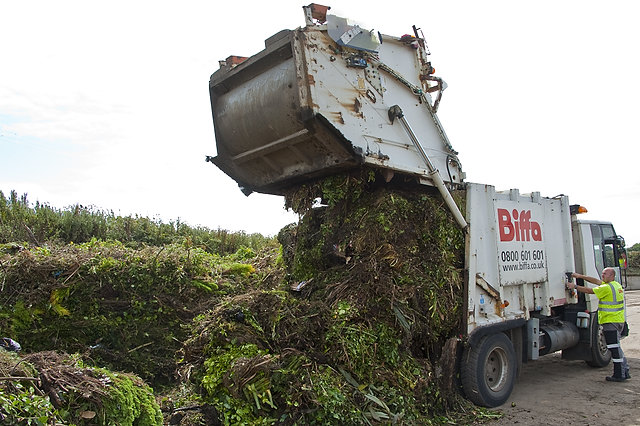
Photographs: Charles Francis
October 2011: A large truck laden with logs, leaves and grass cuttings is approaching the weighbridge at Splattenridden Farm, home of the Green Waste Company. Earlier this morning, the greenery was gathered from properties in Penzance as part of Cornwall Council’s kerbside collection service, and its arrival at the farm near Hayle is the first stage in a recycling process which will turn it into chemical-free fertiliser for both agricultural crops and garden shrubs.
Company director Felicity Richards (pictured below) says visitors are often “flabbergasted” by the sheer scale of the composting operation at Splattenridden: “We were asked by one woman who was here on a guided tour: ‘Do you turn the compost by hand?’” Felicity laughs as she gazes at the high black hills in the yard at the back of the farm. “I can just picture myself out here with a fork. It would be three years’ work.”

The Green Waste Company began in a modest way more than a decade ago, after Felicity discovered that Kerrier District Council’s doorstep green waste collection was going straight to landfill. “We were looking to start composting green waste, and the council was looking for someone to take it,” she says. “The closest company that was taking green waste was at Saltash.
“To start with, we had to hire specialist equipment in from the continent because there was nowhere to buy it in this country, and we found we had to change the settings on the machines. We have a very particular type of green waste in Cornwall, and palm trees leaves were winding around the machinery and jamming it up.
“But people working here on the farm had the skills required to operate the machinery — and things like what times of year to spread the compost were already in their knowledge bank.”

Almost as soon as the centre opened for business, it faced a huge demand for its services. This presented quite a challenge, admits Felicity. “Once you tell a company they can bring stuff here, you can‘t then say: ‘We’ve got enough now’. You’ve got to find a space for what they bring in, and get it processed.
“We now take in more than 20,000 tonnes a year, and the amount is increasing all the time. The government ban on organics going to landfill is a driver for that. Landfill tax is going up, so it’s cheaper to separate it out, as well as being better for the environment.”
Composting at Splattenridden Farm is a very controlled process, from start to finish, says Felicity. “All the material which comes in through the gate is weighed in. We know where it came from and who delivered it. We have CCTV, so we can spot things which aren’t suitable for recycling.”

Some householders who fill sacks for kerbside collection think “garden waste” means any kind of rubbish from the garden, ranging from flowerpots to bits of broken wall. “One of our main problems is plastic in the load, which we try and remove when it’s delivered,” says Felicity.
“Once we’ve done that, the green waste goes into a shredder, which munches it up, then it goes through a screen vehicle which separates the finer stuff. The bigger stuff is then shredded again. At the end of the process, the compost is kept in the yard, where we keep the air moving through it and monitor the temperature.”
The great value of compost, she says, is that it corrects soil pH levels, and provides nitrogen, phosphorus and potassium. “And it’s slow-releasing, so it is a long-term fix. On our farm we’ve eliminated the cost of liming, which used to be up to £10,000 a year.”
The site is not open to the public, but commercial companies, once registered, can visit whenever it suits them. “Most of the material comes from household recycling centres, landscape gardeners, skip companies, and organisations like the National Trust,” says Felicity. “We also get a lot of wood: chairs, tables, pallets. We used to get loads of timber decking, but not so much now”. Much of the wood is recycled for use in kitchen units and office furniture, and even the plastic can be reused in items like weather-resistant garden furniture.
Many organisations bring in a load of green waste and take out a load of compost. Other compost is delivered to organisations within a four-mile radius of Splattenridden or spread on fields at the farm. It is not currently practical to sell it in small bags to local gardeners. “It’s an option we have to look at,” Felicity says. “But we are in a bulk market at the moment, as it’s so expensive to produce small quantities.”
When Felicity married John Richards and came to live at Splattenridden Farm more than 20 years ago, the family business centred round arable crops. Composting began as a farm diversification exercise, but it has become the centre of the operation, and now provides full-time employment for the couple and three employees, plus work for eight casual staff.
The Green Waste Company is in the process of opening a second site, at Roche, near St Austell. “A lot of road miles are being used, bringing stuff here,” Felicity explains. “So it makes sense to open another centre to capture waste from the other side of the county and process it there.”
